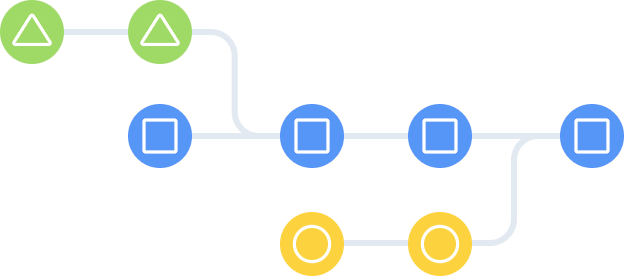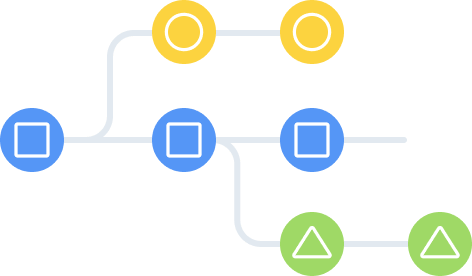Countdown mobile app
You will practice collecting user input, sending scheduled push notifications, sharing data between screens, and working with a database.




Bridge the gap between theory and real-world code by working on curated Java projects. Use DevProjects as practice or enhance your portfolio with these fun Java project ideas. From beginner Java projects to more advanced ones, find your next coding project now.
You will practice collecting user input, sending scheduled push notifications, sharing data between screens, and working with a database.
You’ll create a simple, useful app to remind users to take breaks by customizing the time and length of their breaks. Get regular break reminders through push notifications. Depending on your experience, this project may take 8 to 16 hours.
You’ll create a mobile app to log the user’s mood, what they’re doing, and who they’re with at regular intervals throughout the day. The app will help users learn more about their typical and fluctuating moods. Depending on your experience, this project may take 12 to 20 hours.
You will create a to-do list application by using your preferred mobile application development framework. People are finding it harder and harder to remember and manage daily tasks in this fast-paced world. By creating a to-do list app, users can create and manage their daily tasks more easily.
You'll create a simple app to convert temperatures from Celsius to Fahrenheit, and vice-versa. This project should be implemented as a mobile app.
Taking out loans and calculating monthly EMI can be confusing and stressful. However, with the help of a mortgage calculator, anyone can easily plan their mortgages out. You will build a mortgage calculator in this project!
Whether it's smartphones, cars, or speakers, voice assistants are becoming more and more integral to our everyday lives. Not only so, voice assistants are gaining traction in companies to help streamline operations like Customer Service. In this project, you'll build a full-fledged Joke Telling Robot Mobile App using Text to Speech APIs, which can be applied to both web apps and mobile apps.
As travelling restrictions are beginning to be lifted globally, maybe it’s finally time for you to plan that roadtrip! In this project, you’ll give users the opportunity to list out the destinations they want to visit, let users order them, and display the best route between destinations. There are many ways you can enhance this project and share it with friends and family. Depending on how much extra challenge you take on, this project should take around 20 hours.
Irregular sleeping patterns are a common problem. This mobile app will fulfill the user's needs in tracking their sleeping patterns, including duration and timings. This app will track three parameters: sleep time, wake up time, and sleep duration. Users can add, edit, or remove any sleep entries.
Irregular sleeping patterns are a common problem. This web app will fulfill the user's needs in tracking their sleeping patterns, including duration and timings. You will create a web app to track three parameters: sleep time, wake up time, and sleep duration. Users can add, edit, or remove any sleep entries.
You’ll create a mobile app with a swiping mechanism similar to dating apps like Tinder. Users can swipe left (dislike) or swipe right (like) on images downloaded from the Unsplash API. Through this project, you will learn both the programmatic approach and Storyboard approach to build mobile applications. You will also learn to achieve modularity and reusability with your code.
You will create a mobile application using your preferred technology. Users can authenticate, upload photos from their phone, view other peoples' photos, and vote on each photo. The estimated time for this project is around 25 hours.
You’ll create a mobile app, using your preferred technology for mobile development, to capture photos and information about what you eat.
The background job system is a common component in the modern workflow. It can run jobs in an async fashion, which reduces the latency for clients.
Subscribe to get notified when new Java projects are published.
Subscribe
 HTML/CSS projects
HTML/CSS projects JavaScript projects
JavaScript projects React projects
React projects Vue projects
Vue projects Angular projects
Angular projects Node.js projects
Node.js projects Python projects
Python projects Ruby projects
Ruby projects Java projects
Java projects PHP projects
PHP projects Swift projects
Swift projects React native projects
React native projectsMore coming soon...

Bridge the gap between learning and applying new skills through projects designed by senior developers.

Learn and grow together by asking questions and discussing projects, reviewing code, and giving feedback.

Share your project code to get feedback on code structure, technical decisions, tradeoffs you've made, and more.
Codementor is a community of 12,000+ developers who help each other grow through one-on-one mentorship.
Having been around since 1995, Java is still relevant and remains one of the most popular programming languages today. It’s estimated that 90% of Fortune 500 companies use Java. So Java is important and relevant, but is Java hard to learn? No. In fact, it is a beginner-friendly language that is extremely powerful. One of the reasons why beginners find Java easy to learn is that it is an object-oriented language. This means Java uses objects and classes, which can easily be reused. This also allows beginners to easily learn how to test and troubleshoot code. Additionally, Java can also be used across different operating systems. Java uses a rich standard library, which is also supported by large tech companies, such as Google and IBM. Other companies where Java is used also includes Netflix, Pinterest, and Airbnb. Java is an evolving language and has the unique ability to combine innovation with stability, which is one of the reasons why Java is still relevant decades later. What is Java used for? Java is most commonly used for backend development, but the language can also be used to build Android apps, desktop and web apps, and handle big data.
Project-based learning is a method of learning where you learn a skill through working on a project. This type of learning allows you to learn not only the theory, but also how to apply those skills. By building a Java project, you'll practice the high-level logic of your code and project, and see how each individual line can impact your application. You will also gain problem-solving skills and how to fix it. With so many Java projects available, finding an idea that interests you will make the learning process more fun and sustainable. When you finish building a project, you will have learned and practiced Java techniques, gained problem solving skills, learned how to ask questions, and have a finished project to show off.
The best way to learn Java is to practice Java by building as many projects as possible. There are three factors you should consider when picking the right Java project: your skill level, goals, and interest. You want to have a good idea of your skill level and choose Java practice projects that are not too easy or too hard for you. If you work on Java projects that are too easy, you won’t progress in your coding abilities. However, if you choose projects that are too difficult, you may get stuck, never finish the project, and feel discouraged. Therefore, you want to choose Java projects that are just a little bit above your current skill level. Now, you also want to build Java projects that not only allows you to practice Java, but also lets you show off your skills on your portfolio. So think about the types of Java projects you want to put on your portfolio and jobs you’re interested in as a developer. Think about what your long-term goals are and pick Java projects that align with them. Lastly, you definitely want to choose Java projects that you’re actually interested in and feel connected to. Learning by building Java projects you’re interested in will help you stay motivated. You’ll also be more likely to want to go above and beyond to make your Java project stand out in the crowd.
Java projects are a great way for beginners to learn. Two major obstacles beginners face when learning Java are not knowing why you’re learning Java and losing motivation. By learning Java through building projects, you will be able to overcome both hurdles. When you’re learning Java, you may not know how to apply Java theories in the real world. But when working on beginner Java projects, you immediately learn how each line of code impacts your project. By giving theory context, you’ll understand how to apply theories and find more resources to complete your Java project. These Java projects for beginners can also help you build up your portfolio early on. Each Java project you finish can be incorporated into your portfolio to demonstrate your new skills. Another issue that often comes up for beginners is losing motivation. However, when it comes to projects, you can pick a beginner Java project that you’re interested in. Not only will you be more motivated when you work on something interesting, you’ll also want to continue to improve the project. As your Java project comes together, the sense of accomplishment will give you the momentum to keep going, even when things get hard. Additionally, you’ll learn how to approach problems from multiple angles and teach yourself how to search for answers. The ability to problem-solve is arguably one of the most important skills a developer should have.